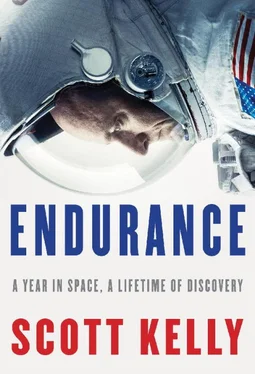When we get word from the ground that it’s time for the deorbit burn, we are instantly, completely awake. It’s important to get this part right. Sergey and Misha execute the burn perfectly, a four-and-a-half-minute firing of the braking engine, which will slow the Soyuz by 300 miles per hour. We are now in a twenty-five-minute free fall before we slam into Earth’s atmosphere.
When it’s time to separate the crew module—the tiny, cone-shaped capsule we are sitting in—from the rest of the Soyuz, we hold our breaths. The three modules are exploded apart. Pieces of the habitation module and instrumentation compartment fly by the windows, some of them striking the sides of our spacecraft. None of us mentions it, but we all know that it was at this point in a Soyuz descent in 1971 that three cosmonauts lost their lives. A valve between the crew module and the orbital module opened during separation, depressurizing the cabin and asphyxiating the crew. Misha, Sergey, and I wear pressure suits that would protect us in the case of a similar accident, but this moment in the descent sequence is still one we are glad to put behind us.
We feel gravity begin to return, first slowly, then with a vengeance. Soon everything is oddly heavy, too heavy—our checklists, our arms, our heads. My watch feels heavy on my wrist, and breathing gets harder as the g forces clamp down on my trachea. The capsule heats up, and flaming pieces of the heat shield fly by the window as it’s scorched black.
We hear the wind noise building as the thick air of the atmosphere rushes past the capsule, a sign that the parachute will soon be deployed. This is the only part of reentry that is completely automated, and we concentrate on the monitor, waiting for the indicator light to show that it worked. It won’t be long, maybe only a second or two, before we feel the jerk of the parachute, but we watch anyway. Everything now depends on one parachute, manufactured in an aging facility outside Moscow by similarly aging workers using quality standards inherited from the Soviet space program. After all I’ve experienced this year—the long days, the grueling spacewalks, living through the missed birthdays and celebrations, the struggles personal and professional—everything depends on that parachute. We are falling at the speed of sound. We fall and wait and watch.
The chute catches us with a jerk, rolling and buffeting our capsule crazily through the sky. I’ve heard this experience compared to a train accident followed by a car accident followed by falling off your bike. I’ve described it myself as the sensation of going over Niagara Falls in a barrel, while on fire. In the wrong frame of mind this would be terrifying, and from what I’ve heard some people who have experienced it have been terrified. But I love it. It’s like a carnival ride on steroids.
Misha’s checklist comes loose from its tether and flies at my head. I reach up and grab it out of the air left-handed. The three of us look at one another with amazement.
“Left-handed Super Bowl catch!” I shout, then quickly realize Sergey and Misha might not know what the Super Bowl is. This is not only a moment to revel in my athleticism; it’s also a good indication that the motion of the Soyuz must not be as crazy as it seems to us—a lot of the perceived motion is our vestibular systems overreacting to the force of gravity.
After all the tumult of the descent, the minutes we spend drifting at the whim of the parachute are oddly calm. Later I will see a photograph taken of our Soyuz dangling under the white-and-orange parachute against the backdrop of a fluffy blanket of clouds. The heat shield is jettisoned, pulling off the burned window coverings. Sunlight streams in the window at my elbow as we watch the ground come closer and closer.
From their position in helicopters nearby, the rescue forces count down over the comm system the distance to go until landing.
“Open your mouth,” a voice reminds us in Russian. If we don’t keep our tongues away from our teeth, we could bite them off on impact. When we are only five meters from the ground, the rockets fire for the “soft” landing (this is what it’s called, but I know from experience that the landing is anything but soft). I feel the hard crack of hitting the Earth in my spine. My head bounces and slams into the seat, the sensation of a car accident. We are down. We have landed with the hatch pointing straight up rather than on one side, which is rare. We will wait a few minutes longer than usual while the rescue crew brings a ladder to extract us from the burned capsule.
When the hatch opens, the Soyuz fills with the rich smell of air and the bracing cold of winter. It smells fantastic. We bump fists.
After Sergey gets out of the capsule, I’m surprised to find that I can unstrap myself, pull myself out of my seat, and reach the hatch overhead, despite the fact that gravity feels like a crushing force. I remember coming back from STS-103 after only eight days and feeling like I weighed a thousand pounds. Now, with a little help from the rescue forces, I pull myself entirely out of the capsule to sit on the edge of the hatch and take in the landscape all around. The sight of so many people—maybe a couple hundred—is startling. It feels indescribably strange to see more than a handful of people at a time, and the sight is overwhelming. I pump my fist in the air. I breathe, and the air is rich with a fantastic sweet smell, a combination of charred Soyuz and honeysuckle. The Russian space agency insists on having the rescue crew help us down from the capsule and deposit us into nearby camp chairs for examination by doctors and nurses. We follow the Russians’ rules when we travel with them, but I wish they would let me walk away from the landing. I feel sure I could. My flight surgeon Steve Gilmore is there, and I’m reminded of what his medical care and friendship have meant to me—over the years, he and other flight surgeons have worked tirelessly to keep me on flight status and kept me flying safely when it would have been easier to declare me unqualified. I notice Chris Cassidy, the chief astronaut, and my friend Joel Montalbano, the deputy ISS program manager. Near Sergey and Misha, I recognize Sergey’s father, a former cosmonaut, and Valery Korzun. In the distance, I see the rescue force troops, some of whom I first met in Russa in 2000 during winter survival training and whose dedication I have come to appreciate and rely on. I notice Misha smiling and waving at them, and I’m certain he’s thinking of his father, who was once one of them.
Chris hands me a satellite phone. I dial Amiko’s cell—I know she’ll be at mission control in Houston along with Samantha (Charlotte watched from home in Virginia Beach), my brother, and close friends watching the live feed on the huge screens.
“How was it?” Amiko asks.
“It was fucking medieval,” I say. “But effective.”
I tell her I feel fine. If I were on the first crew to reach the surface of Mars, just now touching down on the red planet after a yearlong journey and a wild-hot descent through its atmosphere, I feel like I would be able to do what needed to be done. One of the most important questions of my mission has been a simple yes or no: could you get to work on Mars? I wouldn’t want to have to build a habitat or hike ten miles, but I know I could take care of myself and others in an emergency, and that feels like a triumph.
I tell Amiko I’ll see her soon, and for the first time in a year that’s true.
Epilogue: Life on Earth

I’VE BEEN ASKED often what we learned from my year in space. I think sometimes people want to hear about one profound scientific discovery or insight, something that struck me (or the scientists on the ground) like a cosmic ray through my brain at some climactic moment during my mission. I don’t have anything like that to offer. The mission that I prepared for was, for the most part, the mission I flew. The data is still being analyzed as I write this, and the scientists are excited about what they are seeing so far. The genetic differences between my brother and me from this year could unlock new knowledge, not only about what spaceflight does to our bodies but also about how we age here on Earth. The Fluid Shifts study Misha and I did is promising in terms of improving astronauts’ health on long missions. The studies I did on my eyes—which don’t seem to have degraded further during this mission—could help solve the mystery of what causes damage to astronauts’ vision, as well as helping us to understand more about the anatomy and disease processes of the eye in general.
Читать дальше













